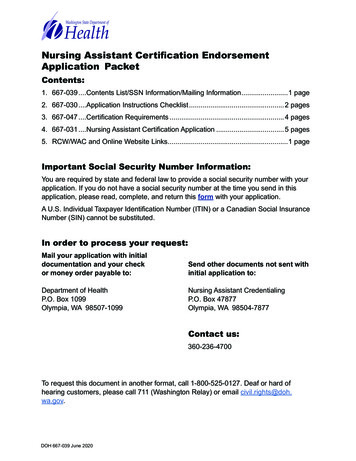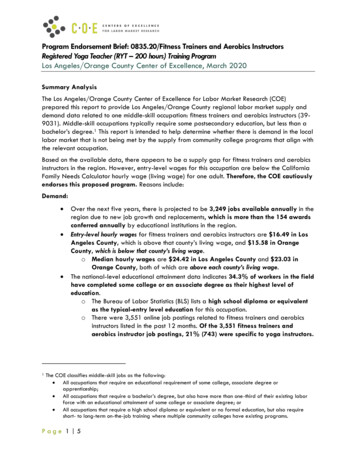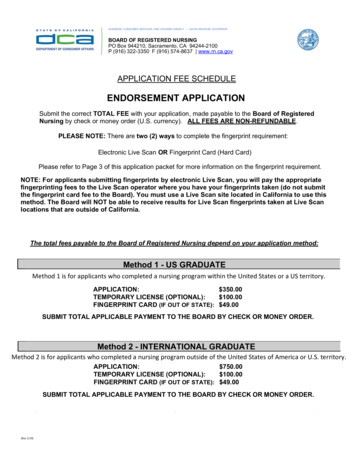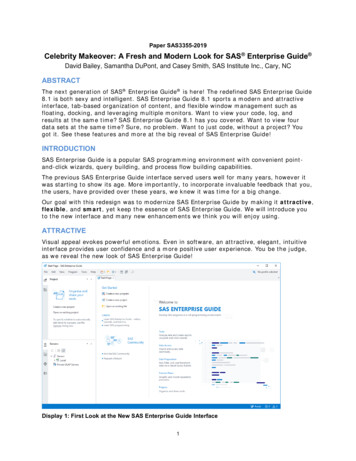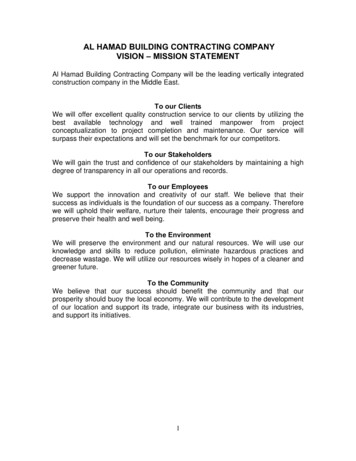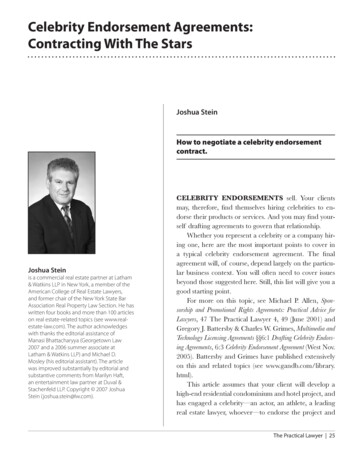
Transcription
Celebrity Endorsement Agreements:Contracting With The StarsJoshua SteinHow to negotiate a celebrity endorsementcontract.Joshua Steinis a commercial real estate partner at Latham& Watkins LLP in New York, a member of theAmerican College of Real Estate Lawyers,and former chair of the New York State BarAssociation Real Property Law Section. He haswritten four books and more than 100 articleson real estate-related topics (see www.realestate-law.com). The author acknowledgeswith thanks the editorial assistance ofManasi Bhattacharyya (Georgetown Law2007 and a 2006 summer associate atLatham & Watkins LLP) and Michael D.Mosley (his editorial assistant). The articlewas improved substantially by editorial andsubstantive comments from Marilyn Haft,an entertainment law partner at Duval &Stachenfeld LLP. Copyright 2007 JoshuaStein (joshua.stein@lw.com).Celebrity endorsements sell. Your clientsmay, therefore, find themselves hiring celebrities to endorse their products or services. And you may find yourself drafting agreements to govern that relationship.Whether you represent a celebrity or a company hiring one, here are the most important points to cover ina typical celebrity endorsement agreement. The finalagreement will, of course, depend largely on the particular business context. You will often need to cover issuesbeyond those suggested here. Still, this list will give you agood starting point.For more on this topic, see Michael P. Allen, Sponsorship and Promotional Rights Agreements: Practical Advice forLawyers, 47 The Practical Lawyer 4, 49 (June 2001) andGregory J. Battersby & Charles W. Grimes, Multimedia andTechnology Licensing Agreements §§6:1 Drafting Celebrity Endorsing Agreements, 6:3 Celebrity Endorsement Agreement (West Nov.2005). Battersby and Grimes have published extensivelyon this and related topics (see www.gandb.com/library.html).This article assumes that your client will develop ahigh-end residential condominium and hotel project, andhas engaged a celebrity—an actor, an athlete, a leadingreal estate lawyer, whoever—to endorse the project andThe Practical Lawyer 25
26 The Practical Lawyerpromote sales. The range of possible celebrity engagements knows no end.1. PartiesFigure out who needs to sign the agreement. Acelebrity will often act through a management company. In that case, satisfy yourself that the management company has authority to sign for and bindthe celebrity. The management company will become your client’s counterparty for at least some“legal” components of the relationship. In thosecases, wherever this article refers to the “celebrity,”you may need to refer instead to the managementcompany.Are any trademarks, copyrights, logos, or otherintellectual property associated with the celebrity?Will your client want to use them or refer to them?If so, who has authority to allow their use?Make sure everyone you need is at the table andsigns the agreement.2. Define The Endorsed ProductDefine the product or service the celebrity willendorse. This will help you think through otherprovisions in your agreement and figure out exactlywhat you will want the celebrity to do. If the celebrity will endorse a hotel and condominium project,is it just this one project? Or will the endorsementsalso cover the developer’s other future projects? Inwhat geographic region? Everywhere? And what ifthe project changes?3. DurationMake the agreement last as long as possible,while preserving your client’s flexibility to terminate the celebrity relationship if it no longer addsvalue. Include not only the “obvious” period forthe agreement but also some possible extension, soyour client can “finish up” its marketing. For example, TV commercials might run after the mainterm of the agreement expires. And if the celebrity’s name or photograph appears on products, yourFebruary 2007client will need the right to sell that inventory untilexhausted.Your client may also want the right (or a rightof first option of some kind) to renew the contractor continue the relationship for other projects.4. Services RequiredWhat does your client expect from the celebrity? Try to describe in detail, to the extent you can,what the celebrity will actually do to promote theproject or other product. If you anticipate the celebrity will make promotional appearances, try todefine how that will work.On the other hand, undertaking a celebrity endorsement program does not have the specificityof building an office building or marketing a pieceof real estate. And the endorsement program maytake shape and change over time. Questions to askinclude: How many appearances will the celebritymake? When? Where? How much notice must your client give? What scheduling procedures will govern? How long will the celebrity be expected to appear? Will the celebrity support only a particularpart or all parts of the project?If the celebrity will endorse a new condominium hotel, for example, think about whether thecelebrity will remain associated with the hotel afterits opening date. This could require coordinationwith the hotel manager and the marketing activities the manager will control. If the celebrity simply agrees to visit or “hang out” at the project for acertain time, define what that means. For athletes,your client will often need to schedule any in-person appearances around the playing season for theparticular sport.Try to have your client think creatively withhelp from the marketing team. Include “catch-all”
Celebrity Endorsements 27and “best efforts” provisions so you can ask the celebrity to do more if you forgot to list it the firsttime. For a list of activities that a celebrity endorsermight agree to perform, see the Appendix at theend of this article.Remember, though, that a celebrity’s first priority must be his or her profession. The celebrity’sservices as an endorser must take second place tothe celebrity’s “day job.”5. Compensation And TimingOf CompensationThe compensation arrangement—how muchand when—will represent a business negotiationthat will vary for every transaction. The fewer obligations your client imposes on the celebrity, thelower the compensation and vice versa. A morewell-known celebrity can command higher compensation.Your client may agree to pay a fixed fee periodically, plus contingent compensation for particularactivities or results. To the extent that compensation depends on sales, your client will first want todeduct taxes, transaction costs, bad debts, returns(actual and projected), and whatever else your client can justify. If the celebrity wants the right toaudit, your client will want to make that right asnarrow, brief, and difficult to exercise as possible.Prohibit the use of contingent-fee auditors.Ideally, your client won’t need to compensatethe celebrity until the celebrity has done everythinghe or she was supposed to do. This isn’t realistic, ofcourse, but you should phase the compensation toreflect services rendered.If a celebrity endorses a condominium andhotel project, for example, the sell-out may takea while, particularly for multiple phases. So yourclient might want to give the celebrity only theright to occupy a condominium unit in the project during the sell-out. The celebrity might receiveoutright ownership of the unit itself (or a right tobuy at a large discount) only after your client hascompleted its marketing program and the celebrityhas delivered the endorsements and other servicespromised.6. ExpensesWhat expenses will the celebrity incur (e.g.,travel, hotel or utilities and maintenance for condominium unit, meals, etc.)? Which of these, if any,does your client intend to pay? The celebrity willtypically expect first-class travel and hotels throughout, to say nothing of personal assistants to preparefor any appearances.7. PerformancesIf the celebrity will perform, additional issueswill arise, such as royalties for songs and possibleclaims by musicians or third parties. These issuesand their resolution are not intuitively obvious, andwill require involvement of a lawyer with expertisein the music business.For rock musicians in particular, the amenitiesand perquisites for any performance have become abizarre subspecialty of contract negotiations. Contracts for these performances often include manypages of specifications that can rival the “specs”for a small construction job. To see more than 200contract riders of this type, for information andamusement rather than as models, visit www.thesmokinggun.com, then click on “Backstage” at thebottom of the home page.8. Use Of Name/PhotographWill any of your promotional materials, or anything else at the project, actually use the celebrity’sname or photograph? If so, your agreement shouldexpressly allow it. The celebrity may want approvalrights, but trim them back as much as you can.Try to obtain pre-approval of any specific useor format that might raise questions or concerns(e.g., displaying the celebrity’s name in six-foothigh letters on a billboard next to the project or inskywriting over major beaches).
28 The Practical LawyerAlso, if you contemplate trying to attract “paparazzi,” the celebrity will not be able to approvetheir work.9. ExclusivityWhat kind of exclusivity do you want? Don’tjust prohibit the celebrity from endorsing directlycompeting products or services, such as high-endcondominiums in the same county where yourclient’s project is located. You might also want toprohibit the celebrity from undertaking incompatible or potentially offensive, inappropriate, orcontroversial marketing programs (e.g., acting asspokesman for a low-end hotel chain or discountstore, the fur industry, ski vacations if your client’scondominiums are by the beach, abortion rights,politicians, religious or quasi-religious causes, etc.).You might not want the celebrity to participate inany public activities that might be identified withyour client’s competitors.How you approach this subject will depend onthe size and nature of the market your client hastargeted. It will also depend on the particular celebrity involved, and that celebrity’s attraction forcontroversy. A leading movie star who has repeatedly expressed strong support for the war in Iraq,for example (is there one?), may not want to agreeto sit down and shut up to protect your client fromcontroversy.Exclusivity may start to burn off at a certainpoint or if the celebrity’s compensation during aparticular period has not reached a particular level.Conversely, exclusivity may also continue for sometime after the main agreement terminates.Even after full termination of the endorsementrelationship, you may still want to bar the celebrityfrom undertaking future promotion programs, forother sponsors, that somehow refer to a slogan ortheme the celebrity used in your client’s program.February 200710. InfringementWhat happens if the celebrity violates the exclusive, or someone else uses the celebrity’s nameor picture to promote a competing project? In general, you want your client to have the right to takeaction and obtain appropriate equitable relief. Thecelebrity should authorize your client to enforce thecelebrity’s rights, at least if the celebrity does notdo so.11. Death/InsuranceIf the celebrity’s death would significantly impair the marketing program, consider obtaining asuitable life insurance policy, something like a “keyperson policy,” to cover this risk. This would require the celebrity’s consent. Consider similar issues about the celebrity’s disability or injury.12. Changes In ActivitiesWhat assumptions are you making about thecelebrity’s activities? If the celebrity is a tennisstar, for example, would you want to rethink thearrangement if they decided to hang up their racquet in favor of practicing trusts and estates law fulltime? Your client may want the right to terminateif the celebrity does not maintain a certain level ofinvolvement in his or her “primary” celebrity role.13. External SurprisesThink about what could go wrong (externally)and how it might affect the relationship betweenyour client and the celebrity. Examples includeconstruction delays, substantial interference withtravel to the local area, and natural disasters.14. Early TerminationIf your client were to drop the project, whatshould happen to the arrangement with the celebrity? In a substantial real estate development project, the client will probably want the right to decidenot to proceed. This might trigger some equitable
Celebrity Endorsements 29dollar compensation and then the parties should gotheir separate ways.On an equally optimistic plane, what happensif your client decides the relationship with the celebrity isn’t working out or adding as much value asthe client thought? Again, your client should havethe right to terminate with some equitable compensation, less than the full compensation originallycontemplated.Early termination could also require a noticeperiod (or payment in lieu of notice).The celebrity might want some minimum “testperiod” before your client can end the relationship.Conversely, your client may want a “probationary”period, with the right to terminate for any reasonor no reason during the first, e.g., 90 days. All ofthese points can be negotiated, probably in tandemwith negotiating up-front payments and termination fees.The company engaging a celebrity endorserwill also want the right to terminate the arrangement if the celebrity: Does something that is offensive or contraryto your client’s best interests, or gets involvedin some kind of scandal or other negativenews reports. (Your client might want to actas judge, jury, and executioner on this issue.More typically, though, you should expect tosee an objective test, such as whether “mainstream media outlets have publicly reported”that the celebrity has “acted in a mannerthat is generally perceived by the public to besocially reprehensible and significantly beyondgenerally accepted norms”); Misrepresents or conceals the celebrity’s background; Is indicted or accused of some form of criminal activity (conviction shouldn’t be necessary); Fails to remain in the public eye, which can bedefined in some reasonable way depending onwhat kind of celebrity is involved; Fails to maintain a certain performance level(e.g., winning at least a certain number ofgames or races every year); or Retires.Will termination make your client whole in anyof these cases? If not, you may want the right toclaim something more than just a right to terminate. But your client could probably never persuadea court of the exact “damages” any of these eventscaused. Hence you may want to give your client theright to liquidated damages. The celebrity may reject the concept out of hand and try to negate anypossible liability (beyond termination of the agreement) under these circumstances. Your client will atleast want the right to retain any sums still due thecelebrity at that point.Conversely, the celebrity will want terminationrights if your client violates the agreement or, perhaps, fails to market its goods or services to a certaindefined degree. (Remember, the celebrity benefits,too, by being in the public eye. If this arrangementdoesn’t achieve that result, the celebrity may wantto rethink it.)15. SuspensionYour client might want the right to suspend thecelebrity endorsement arrangement, without losing it, and suspend monthly payments, if for somereason your client suspends or delays its underlyingbusiness.For example, if environmental surprises forceyour client to suspend its condominium development for a year, your client might want to be able to“keep” the celebrity tied to the project, but suspendpayments while the project is stalled.16. Agency/BrokerageThe celebrity should agree to pay any agencycommissions, management fees, administrationfees, and so on (just like real estate brokerage commissions), except to the extent that your client hasexpressly assumed that obligation.
30 The Practical LawyerFebruary 200717. Coordinate With Other MarketingYour client will want to coordinate the promotional activities that involve the celebrity with therest of the client’s marketing program. This doesn’taffect the agreement with the celebrity much, except that it emphasizes the need for the client tohave strong controls over exactly what the celebritydoes and when.18. ConfidentialityHow confidential does the client want the relationship with the celebrity to be? Define that understanding as part of the agreement. Conversely, willthe celebrity expect the client to keep the arrangement confidential? Laws and regulations (such asFCC rules on “promotional consideration”) mayrequire “disclosure” of the fact that your clientcompensated the celebrity. Any confidentialityclause will need to include the usual exclusion forlegally compelled disclosure, which could turn outto be rather broad.And what if the celebrity breaches the confidentiality clause? Damages will be next to impossible to prove. So you may want to provide forliquidated damages and the right to withhold anyamounts your client still owes the celebrity.19. Previous AgreementsThe celebrity will need to assure your client thathis or her arrangements with your client do not violate any previous agreements with other marketers,sponsors, companies, or other third parties.CONCLUSION If a celebrity endorsementagreement covers these points, and whatever further points might arise from thinking about yourclient’s business strategy and expectations and negotiating the points suggested above, then your client should be well on its way to having a celebrityendorsement arrangement that will add value, notproduce unpleasant surprises or impose an unreasonable burden.AppendixPossible Celebrity Responsibilities Under Endorsement ContractA celebrity might agree to perform some of the following tasks under a hypothetical contract providingfor the celebrity to endorse a high-end hotel and condominium project. The celebrity’s responsibilities willvary, of course, with all the circumstances, including the nature of the project, the expectations of the parties, and the recommendations of your client’s marketing team: Appear at press conferences to announce project-related milestones; Announce the celebrity’s plans to travel to the project for vacations and events; Use the celebrity’s photograph in brochures, websites, on-site signage, promotional give-away products; Cross-link between the celebrity’s website and the project’s website;
Celebrity Endorsements 31 Host parties for other celebrities, thought leaders, media, real estate lawyers, etc., either on-site or inmajor cities, themed to promote the project; Arrange photo shoots, movie shoots, etc., at the project (although media companies will probablyhave their own ideas of appropriate locations); Reside at the project a certain number of days every year, and try to make sure the media knowsabout these living arrangements; The celebrity will be entitled to, and should try to use, a certain amount of free food, beverage, andspa services at the hotel every month; Perform at the project (additional compensation); Own, dock, and/or use a boat at the project, if it includes boating-related components; Allow the developer’s PR team to notify paparazzi of celebrity’s arrival, departure, and other activities at the project; Mention the project in press interviews (and elsewhere), particularly if arranged by the developer’sPR team; Participate in design or brainstorming sessions about the project, so that promotional materials cansay that the design reflects the celebrity’s ideas and suggestions (see, e.g., www.jadenyc.com); If the celebrity is a musician, assist in developing or performing a theme song; Attend marketing events; Cooperate in whatever promotional/PR activities the developer’s PR team comes up with from timeto time (wide open—the celebrity may insist on approval rights); Participate in events that the hotel manager arranges; coordinate the celebrity’s promotional activities
contract. Celebrity endorsements sell. Your clients may, therefore, find themselves hiring celebrities to en-dorse their products or services. And you may find your-self drafting agreements to govern that relationship. Whether you represent a celebrity or a company hi

